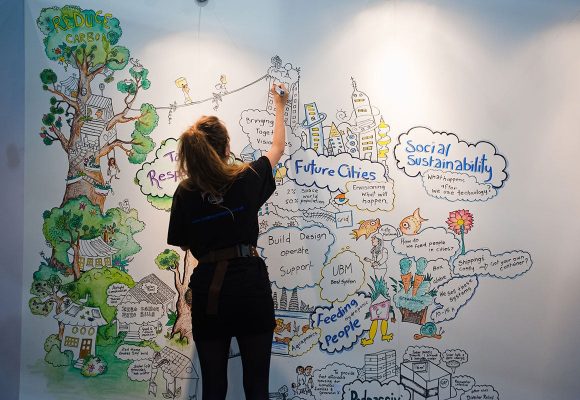About the cluster
ecobuild.brussels aims to develop and structure the offer in sustainable construction in the Brussels-Capital Region to help companies become more competitive and win new markets.
As an actor of change, ecobuild.brussels focuses its action on the renovation of the building stock and on the circular aspects of construction.

Our mission
“ecobuild.brussels supports companies in the sustainable and circular construction sector in the Brussels-Capital Region by providing tailored services: guidance, access to cutting-edge information, networking events, visibility for their expertise, and opportunities for internationalization.
Our mission: to structure a dynamic and circular ecosystem that makes Brussels a benchmark for sustainable construction.”
Learn more
A development and promotional tool for a sector and its competitiveness. It creates a network of companies with converging activities focused on the same region.
The interaction between the different actors (industry, public authorities, science and the community) are described by the theory of the quadruple helix with the cluster in the center as a generator .
The ecobuild.brussels cluster is driven by a concern for sustainable development. It promotes the ecological, economic and social dimensions of the construction sector.
To define sustainable construction, ecobuild.brussels has adopted the interpretation put forward by Buildwise.
According to a full interpretation, sustainable building can be described as the search for buildings that provide a balance of the three following perspectives:
- environmental perspective
- social perspective
- economic perspective
According to this approach, in order to be considered sustainable, buildings must not only be energy efficient or constructed using recycled materials, but also be healthy and comfortable on the inside, as well as being safe and accessible. Costs associated with the construction, maintenance and the building’s life cycle ultimately play an important role.
Furthermore, for ecobuild.brussels, the idea and the realisation of a sustainable construction project draws on a holistic approach, bringing together a reflection on the 9 themes of Le Guide Bâtiment Durable de Bruxelles Environnement (Brussels Environment Sustainable Construction Guide).
The goal is to be able to assess the sustainability of a business or project via a “Belgian sustainable building” reference framework.
- Managing the project, construction site, building: To organise your project’s sustainable management, from construction site to building maintenance.
- Mobility: To encourage multimodal and sustainable mobility.
- Developing nature: To integrate nature into the site and improve urban living conditions.
- Physical environment: To limit the impact of the building on its surroundings.
- Human environment: To encourage social interaction and guarantee housing accessibility for everyone.
- Materials: To select materials that limit the building’s environmental impact throughout its life cycle.
- Energy: To achieve the highest possible energy performance.
- Water: To optimise water management.
- Wellbeing, Comfort & Health: To ensure acoustic, thermal, visual and respiratory comfort.
Do you want to build differently too? Make way for circular design principles, reuse and new business models.
Moving from a linear to a circular economic model in construction
This approach advocates circular design, building maintenance, reuse and remanufacture (in that order) throughout the Brussels region. Designing buildings capable of adapting to new uses while limiting the environmental impact of these transformations, using our built environment more intelligently, promoting the continued circulation of physical resources, building using salvaged materials… these are just a few of the concepts at the heart of this vision.
Approach and key elements of the circular economy for the construction sector
Circular design and construction: from design to completion
- Designing for adaptability (concept and planning)
- Designing in layers (layers)
- Choosing materials (materials)
- Planning for dismantling and deconstruction (assembly)
- Avoiding waste and maximising resources (waste)
Urban mining: using materials already available in existing building stocks
- Selective deconstruction (deconstruct)
- Reuse and preparation for reuse (reuse)
- Remanufacturing
- Recycling
Economic models in circular construction: creating new value chains and added value for stakeholders
- The functional economy
- The sharing economy
- The lifetime extension economy
The ecobuild.brussels cluster was launched in November 2006 by the Brussels-Capital Region. The Brussels Minister of Environment, Energy and Urban Renewal and the Brussels Minister of Economy, Employment and Scientific Research of the time took the decision to support the sustainable construction and renovation sector.
The Brussels built-environment is highly energy-consuming. The construction sector, and especially the renovation sector, is under pressure to make far-reaching changes in order to achieve the objectives of the government. Two examples: A strategy to make Brussels a low-carbon city by 2050, or the obligation to build passive buildings since January 2015 in the Brussels-Capital Region. In order to take up these challenges, sector companies can count on the support of the cluster and its many partners.
This support was strengthened in late 2010 with the injection of additional resources and the integration of the ecobuild.brussels cluster as a key stakeholder to steer many actions within the Employment-Environment Alliance. Since 2016, the cluster has been heavily involved as a partner in realising the ambitions of the construction section of the PREC [Regional Programme for Circular Economy], which has taken over from AEE.
ecobuild.brussels is hosted by hub.brussels.
Do you want to learn more about all the advice, services, and tools that hub.brussels, the Brussels Business Support Agency, can offer you? Visit hub.brussels.

